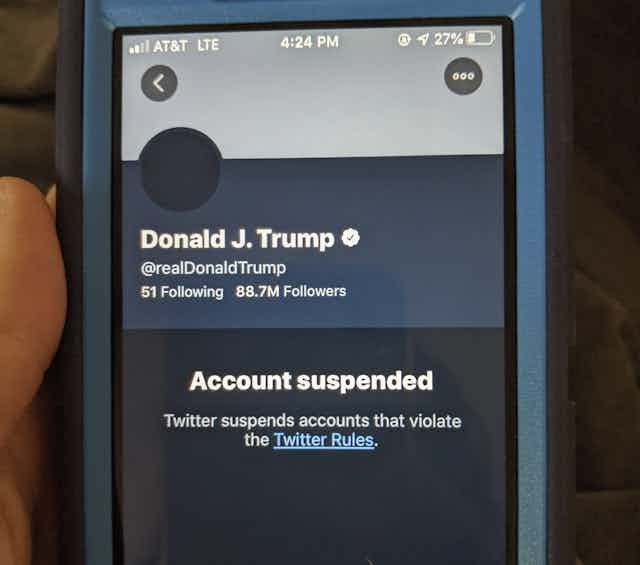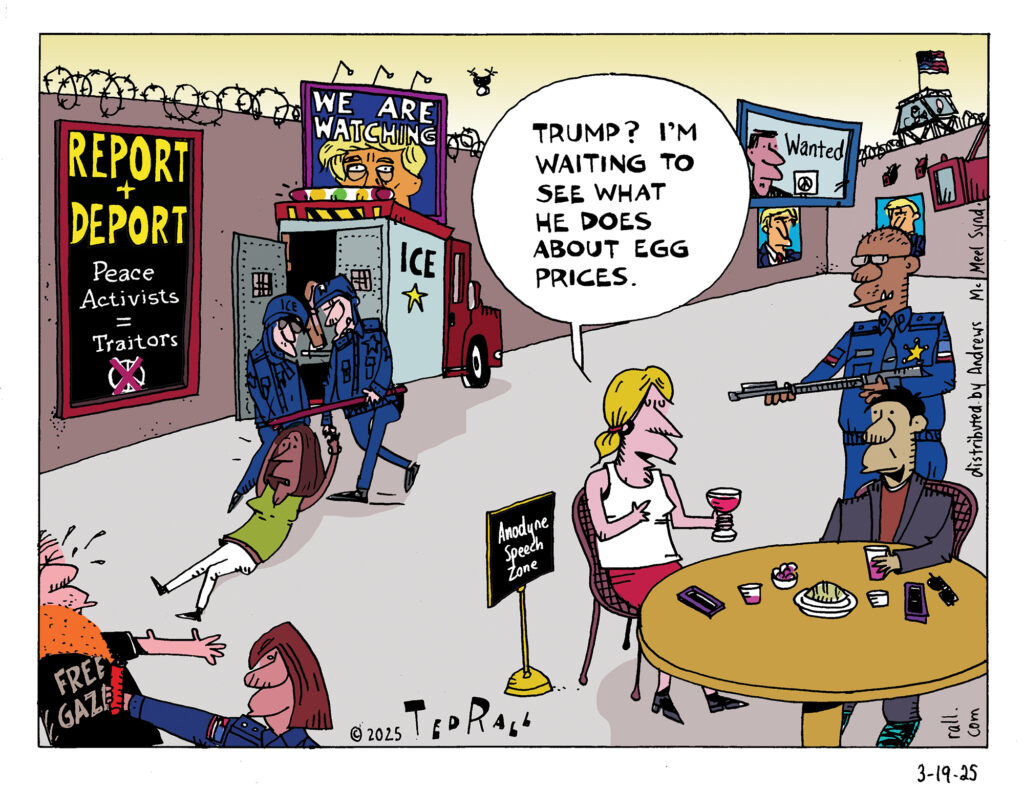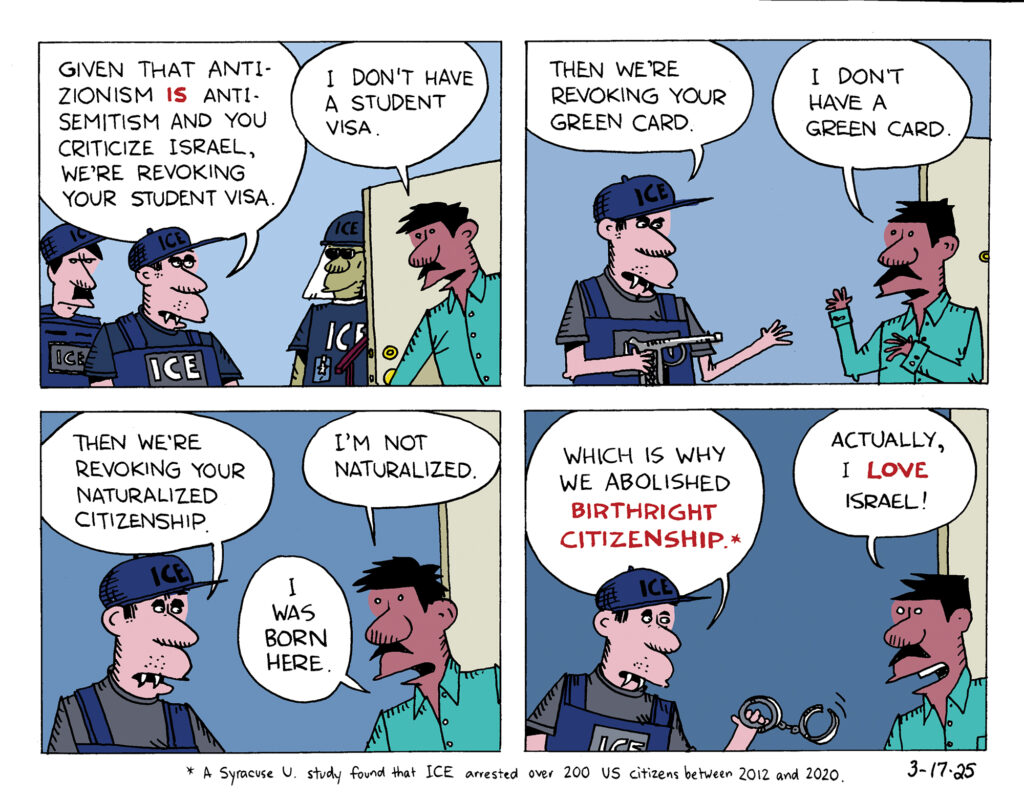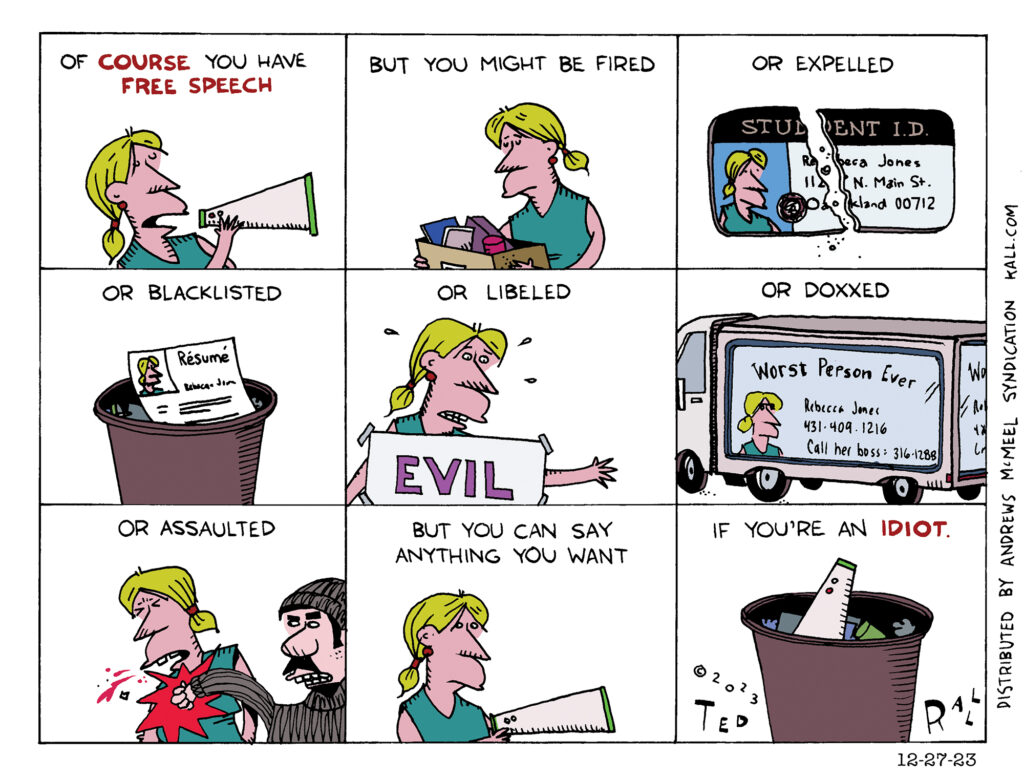Consumers obsess over inflation; like egg prices topping $4; but barely notice a green card holder’s arrest for peacefully criticizing Israel. The contrast is sharp: grocery hikes since 2022 spark loud gripes; while a free-speech crackdown gets muted shrugs. Eggs hit wallets daily; tracked by CPI; the detention feels remote; abstract. Economic woes drown out systemic overreach; showing how personal costs overshadow eroded rights.
ICE Arrest of Green Card Holder Signals Crackdown on Israel Critics
The arrest of Mahmoud Khalil, a green card holder, by ICE agents expecting a student visa reveals a chilling escalation in the Trump DHS’s targeting of Israel critics. This assault on free speech suggests even citizenship may not protect dissenters, as the administration prioritizes silencing opposition over constitutional rights. The incident underscores a growing threat to personal freedoms, challenging the security of legal status in the face of authoritarian overreach.
TMI Show Ep 84: Media Mayhem: the Trump Effect?
Live at 10 am Eastern/9 am Central time, and Streaming 24-7 Thereafter:
Even before the election, The Washington Post and The Los Angeles Times read Trump’s polls and censored their own Kamala endorsements. Then the tech bros who run social media donated to his inaugural. ABC News and Meta decided to punt in court and pay out big defamation claims Trump would probably have lost–were they bribes?Is Trump’s bullying chilling the media? It certainly looks like it. MSNBC has canceled Joy Reid’s primetime TV show. In another indication that journalists are under siege, a Mississippi judge ordered a newspaper to take down an editorial.On “The TMI Show” Ted Rall and Manila Chan, fresh from CPAC–where the big names didn’t bother to engage reporters–discuss the muzzling of the news media, the watchdog of democracy.
DMZ America Podcast Ep 188: Ann Telnaes Quits Washington Post
Free speech is in the news! Editorial cartoonists Ted Rall (on the Left) and Scott Stantis (on the Right) discuss the high-profile departure of their colleague, Pulitzer-winning political cartoonist Ann Telnaes, from The Washington Post. Meta and Facebook are getting rid of their fact checkers. And TikTok is begging the Supreme Court for its life.
TMI Show Ep 53: “Facebook: Now with 40% Less Censorship”
LIVE at 10 am Eastern time today and STREAMING whenever:
Never embarrassed to be seen blowing with the political winds, Facebook CEO Mark Zuckerberg spent the last four years leading Silicon Valley’s censorship-industrial complex. Facebook openly admitted throttling all political content on the grounds that users didn’t like it. It hired an advisory panel with clear ideological blind spots. Most notoriously, Facebook turned to outsourced fact checkers who decide whether or not posts get blocked and users get banned even though they rarely had any expertise in the controversies they were asked to weigh in on, and made frequent mistakes. Now, at least, Zuckerberg says the fact checkers are no more.
Co-hosts Ted Rall and Manila Chan are joined by guest Peter Coffin to ask: is Facebook really entering the Free Speech Zone? If so, how long will it last in the second age of Trump?
DMZ America Podcast Ep 183: The Censorship War Against Political Cartoonists
The DMZ America Podcast’s Ted Rall (on the Left) and Scott Stantis (on the Right) are joined by Terry Anderson of the Cartoonist Rights Network International to discuss the state of political cartooning in the United States and around the world during a time of political transition and the ongoing seismic disruption in the print media ecosystem that supported the profession throughout the previous century.
Refusing to Censor Speech Isn’t the Same as Agreeing with It
 If someone said something I found annoying or offensive, my mother taught me, the appropriate response was to allow them to finish speaking and reply with a calm, considered counterargument. Now you’re supposed to talk over them until they shut up.
If someone said something I found annoying or offensive, my mother taught me, the appropriate response was to allow them to finish speaking and reply with a calm, considered counterargument. Now you’re supposed to talk over them until they shut up.
Or, better yet, cut their mic and show them the door.
Censorship has become a bipartisan norm. Why waste the time and energy to conceive and articulate an intelligent rebuttal when you can make your opponent shut up?
Alan Dershowitz, a nationally-known former Harvard Law professor, announced that he was leaving the Democratic Party because the party’s organizers allowed pro-Palestinian speakers to address its convention in Chicago. “They had more anti-Jewish, anti-Zionist people who were speaking, starting with [Representative Alexandria Ocasio-Cortez]–a miserable, anti-Zionist bigot,” Dershowitz said on “Talkline with Zev Brenner.” “Then of course they had [Senator Elizabeth] Warren, who is one of the most anti-Jewish people in the Senate. Then they had Bernie Sanders, one of the most anti-Jewish people in the Senate.” (Sanders is Jewish.)
“[B]y giving them platforms, what it says is that when AOC does call Israel a genocidal country and rails against it, she now has the imprimatur of the Democratic Party,” he argued.
On the opposite side of the ideological divide, high-profile podcaster and ex-Fox News host Tucker Carlson caught flak for hosting Darryl Cooper, a Holocaust revisionist, on his show on the social media platform X. Representative Mike Lawler of New York, told The Jewish Insider: “Platforming known Holocaust revisionists is deeply disturbing.”
I’m a leftist. Some of my fans lost their minds when I invited former Klansman David Duke to guest on my old talk-radio show on KFI Los Angeles. Feeling betrayed, they accused me of amplifying and tacitly endorsing a voice of the racist alt-right. I recall the exchange as vigorous, challenging and a rare opportunity to hear ideas on both sides of a variety of issues aired in an intelligent format.
The way I saw it, many Americans share Duke’s far-right views whether they hear them on the air or not. This was a chance to expose the existence of these thoughts to blissfully unaware liberals and workshop arguments against them. I would do it again in a heartbeat—but I’d become the target of even more venom now.
Platforming speech is not the same as endorsing what is said.
Platforming is the act of providing a means of public expression. A newspaper that publishes an interview with or even just a short quote by a person gives them a platform. A college that invites someone to give a speech or participate in a panel discussion is engaged in platforming, as is a cable network that decides to add a channel to its lineup.
None of these actions is a tacit endorsement.
Nor can it be.
Unless it limits its opinionists to a single voice or aggressively enforces a rigid set of ideological strictures upon a group of them—no one need apply unless they are, for example, socially liberal, fiscally conservative and opposed to military adventurism except in Myanmar—any newspaper’s decision to simultaneously platform one writer who disagrees materially with a second writer (and a third and a fourth) means that, by definition, there are contrasts and disagreements. Inherently, because no institution can simultaneously endorse conflicting points of view, no endorsement has occurred
Many news stories include quotes by both a Democrat and a Republican. If platforming the Democrat is an endorsement, how should one explain the appearance of the Republican? Most universities host speakers representing a range of views on a variety of subjects, many of them controversial. It makes no sense to imply that those institutions agree with everyone they invite on campus.
Until fairly recently, most Americans appreciated the value of showcasing a spectrum of ideological and stylistic views in public fora. Supreme Court Justice Louis Brandeis famously wrote in 1926 that the solution to offensive speech was “more speech, not enforced silence.” Today what we call Brandeis’ counter-speech doctrine—the answer to bad speech is good speech, not censorship—is in grave danger. Rather than argue against their opponents, cultural and journalistic gatekeepers are increasingly resorting to telling those with whom they to disagree to STFU.
Censorship drives dangerous rhetoric underground. It conveys a sense that purveyors of “mainstream” opinion are contemptuous of others, unable to defend their views, possibly intellectually feeble, and just plain bullies. Mostly, it doesn’t work.
After the January 6, 2021 attack on the Capitol, Twitter suspended 70,000 accounts, including that of President Donald Trump. Facebook acted similarly. A year later, in 2022, liberal censors claimed victory. “The best research that we have suggests that deplatforming is very powerful,” Rebekah Tromble, director of the Institute for Data, Democracy and Politics at George Washington University, told NPR. “It means that really prominent actors who helped stoke the Stop the Steal campaign that led to the insurrection have much less reach, get much less audience and attention. And that is very, very, very important.”
Was it? Donald Trump, the biggest January 6er of them all, is also the undisputed kingpin of the Republican Party, in whose primaries he ran unopposed. Running neck and neck with Kamala Harris, he may easily be reelected.
The belief that editors, producers, tech CEOs and other gatekeepers control enough outlets to deny their enemies an outlet to a significant audience is a profoundly flawed assumption. To whatever extent this was true in an era of four television news networks and cities with a morning and afternoon paper and not much else—and, even then, there were underground presses and alternative newsweeklies like The Village Voice—the Internet has blown that idea to smithereens. Al Jazeera, the Qatar-based cable news network whose American channel was shut down after the War on Terror-era Bush Administration leaned on U.S. broadcasters, disseminates live news from Gaza and other global hot spots via its website, which is one of the biggest in this country. InfoWars, Alex Jones’ “fringe” news site, gets 19 million views daily despite Jones’ epic legal defeat at the hands of parents whose children were killed at Sandy Hook Elementary School, who were awarded $1 billion. Any government or other corporate entity that tries to control information narratives in an era of fragmented media is playing whack-a-mole with a million rodents.
As long as there’s an audience for what someone has to say, you can’t keep a good—or bad—man down.
(Ted Rall (Twitter: @tedrall), the political cartoonist, columnist and graphic novelist, co-hosts the left-vs-right DMZ America podcast with fellow cartoonist Scott Stantis. His latest book, brand-new right now, is the graphic novel 2024: Revisited.)
DMZ America Podcast #144: USC Censors Its Valedictorian for Being Palestinian, Trump on Trial, Biden’s Weird Steel Tariffs
 Cartoonists Ted Rall (from the Left) and Scott Stantis (from the Right) are back at their respective abodes in New York and Alabama. As always, Ted and Scott put friendship first in their spirited but civilized debates and discussions about the issues at hand.
Cartoonists Ted Rall (from the Left) and Scott Stantis (from the Right) are back at their respective abodes in New York and Alabama. As always, Ted and Scott put friendship first in their spirited but civilized debates and discussions about the issues at hand.
First up: The University of Southern California denies this year’s valedictorian Asna Tabassum
her right to deliver the commencement address because she is Palestinian and might have had the audacity to call for Palestinians to stop being slaughtered en masse by Israel in Gaza. If ever there was cause for people of all ideological stripes to be appalled albeit for different reasons, here it is.
Next: Donald Trump becomes the first former president to face a criminal trial. Scott and Ted dissect the nature of the charges, related to the payment of hush money to Stormy Daniels, and explore the disturbing trend of prosecutors letting members of the public that they’re so out to get them that they’re willing to campaign on it.
Finally: Joe Biden imposes brutal tariffs to protect America’s steel industry, which is now owned by Japan, from China.
Watch the Video Version: here.
Embrace Partisanship, Encourage Censorship
We already know partisanship can be toxic. It also has some overlooked side effects. Team politics — the type of partisanship in which adherents of a party excuse every act of hypocrisy and wrongdoing by their own side while exaggerating and lying about the purported evils of the other — fuels censorship.
Consider climate change, by some measures the issue about which Democrats and Republicans most disagree. During its four years in power the Trump Administration deleted more than 1,400 references to global warming from U.S. government agency and department websites. Climate scientists reacted by censoring themselves, using terms like “global change,” “environmental change,” and “extreme weather” instead.
After Biden took over, it was Democrats’ turn to suppress dissent. The new president’s top climate-change advisor pushed Silicon Valley to crack down on climate-change skeptics. Facebook, which like most social media companies is aligned with Democratic politics, now classifies posts that deviate from majority scientific opinion as “misinformation” and deletes them. In response to the change in political winds, some scientists have reversed their public stances in order to reduce their risk of losing funding.
Whatever you think about climate change or other issues, reasonable people ought to be able to agree about how to disagree: let everyone speak. Open and vigorous discussion and debate is the most effective way to arrive at societal consensus based on solid information. There’s a catch: you have to be willing to hear and listen to opinions with which you disagree expressed by people you may dislike.
We are moving away from that ideal. According to polls, we are becoming less tolerant of opposing views. 55% of Americans tell Pew Research that the federal government should restrict false information even if their censorship restricts freedom of information, up from 39% in 2018. (70% of Democrats share this view as opposed to 39% of Republicans.) 65% are OK with tech companies censoring speech, up from 56% in 2018.
Americans support free expression of views with which they agree. The other side, they think, should be neither seen nor heard. 36% think banning hate speech is more important than free speech and 35% don’t think the First Amendment should protect comedians and satirists, according to a 2021 Freedom Forum survey. Only 63% would vote for the First Amendment if it were on the ballot.
So Southern conservatives ban LGBTQ+ books while liberals turn a blind eye to Twitter shutting down accounts belonging to Donald Trump and the right-wing New York Post, the latter over the Hunter Biden laptop story—which turned out to be true. Democrats lose sometimes, Republicans lose other times, and the censors win all the time.
As a left-leaning cartoonist and writer, I have often found myself under political fire amid calls to silence me by terminating my employment or not permitting my work to be distributed. A former candidate for president even suggested that I ought to be executed. Even though I have spoken out publicly against liberal censorship campaigns directed at right-wingers like Dr. Laura Schlessinger and Rush Limbaugh, no conservative has come to my defense.
Now the cancel-culture brigade has moved from right to left and the censors are targeting conservatives. The satirical news site Babylon Bee, the social media platform Rumble and other figures on the Right have filed a court challenge to a new New York State law that prohibits social-media posts a court determines to “vilify, humiliate, or incite violence against a group” over “race, color, religion, ethnicity, national origin, disability, sex, sexual orientation, gender identity or gender expression.” The law, backed by heavy fines and probably unconstitutional because “hate speech” is protected under the First Amendment, also requires aggressive comment moderation and mandates that angry readers be provided with a venue to report offenders.
My first reaction is to be appalled by Attorney General Letitia James’ heavy-handed attempt to curb freedom of expression. My second is to note the right-leaning politics of the plaintiffs. Conservatives are silent when their allies and fellow travelers go after people like me. Why should we speak up on their behalf? Why not zap up some popcorn, pour a glass of Chardonnay and bask in the schadenfreude?
The answer, of course, is that the enemy of my enemy isn’t always my friend. As committed as I am to my Marxist-Leninist point of view, rhetorical class war must take a back seat to the fight against censorship even when the censors identify with the left and their victims belong to the right. A society in which censorship becomes normalized is doomed to authoritarianism and dictatorship without any political debate whatsoever; odds are slim indeed that what remains will be an ideological orientation that you will personally find agreeable. Team politics divides victims of censorship and benefits the forces of repression.
Whether they know it or not, the editors of the Babylon Bee and their allies are defending people like me. I hope that conservatives will draw the same conclusion and start to form alliances of convenience with the left when we struggle for the right to be heard. As for me, I support anyone who takes on censors, liberals and conservatives alike.
(Ted Rall (Twitter: @tedrall), the political cartoonist, columnist and graphic novelist, co-hosts the left-vs-right DMZ America podcast with fellow cartoonist Scott Stantis. You can support Ted’s hard-hitting political cartoons and columns and see his work first by sponsoring his work on Patreon.)



